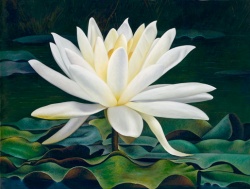White Lotus Society
"White Lotus Society. Chinese religious sect which developed out of Pure Land Buddhist lay associations in the southern Sung dynasty (A.D. 1127-1279), but which departed from its orthodox antecedents by instituting married clergy and full-time vegetarianism. By the late thirteenth century this movement had developed its own rituals and temples, and had incorporated a variety of folk practices and beliefs from Taoism. "
In the mid-fourteenth century several White Lotus groups rebelled against Mongol rule in the name of both Maitreya and the Manichean King of Light. "
"White Lotus school - (Chin., Pai-lien-tsung); a school of Pure Land Buddhism, founded by Mao Tzu-yuan in the 12th century. The White Lotus school was an association of monks, nuns, and laypersons, whose objective was by regularly invoking the Buddha Amitabha... This school... was soon discredited as being linked with demons, and it was banned several times; nevertheless it survived. Later on Maitreya... was venerated along with Amitabha... the White Lotus school became a secret society and played an important role in the rebellions and peasant insurrections of the 13th-15th centuries... "
In the sixteenth century popular sects of the White Lotus type developed a new form of scripture texts called pao-chuan ('precious books')... Some of them organized eschatological uprisings against the government, the most famous of which took place between 1795-1805, the so-called 'White-Lotus rebellion.' "
In the sixteenth century popular sects of the White Lotus type... characterized by charismatic leadership, hierarchical organization, membership rituals, and congregational worship... Similar sects still flourish in Taiwan. "
About 1771:
A White Lotus sectarian named Wang Lun teaches his disciples two things. First, skill in boxing would protect them from swords and spears. Second, magical incantations would protect them from musketry and archery. "If I call on Heaven, Heaven will assist me; If I call on Earth, Earth will give me magical strength," said Wang. Although a staunchly millenarian view, it was made credible by local militia units whose leadership, weapons, training, pay, and morale were horrible. Unfortunately, Manchu banner units were another matter altogether. When Wang Lun's White Lotus rebels met banner-men in 1777, said a rebel later, "The soldiers fired their guns and bows. Wang Fu-lin and the others were shot; many people were wounded. I did not watch the fight. I held the incense and called on Heaven, but there were no divine results, so I fled."
1774: Wang Lun Uprising. Shandong. Rebels under the leadership of a martial arts and herbal-healing expert (Wang Lun) claimed support of "Eternal Venerable Mother Goddess" - traced back 500 years earlier - tradition of millenarian view of catastrophe on earth < tradition of underground folk religion (= heterodox) "White Lotus Buddhism".
- Followers: peasants, actors, poor merchants, monks etc.
- No particular political platform: general feelings of antagonism to the dominant forces in society reinforced by simple forms of spiritual euphoria
- Qing counter-attack; rebels slaughtered
- Symptom of deep underlying discontent
